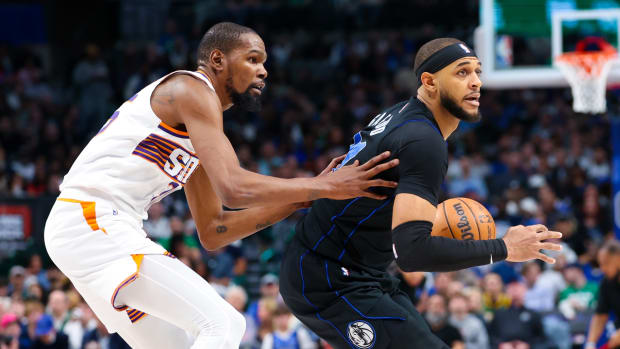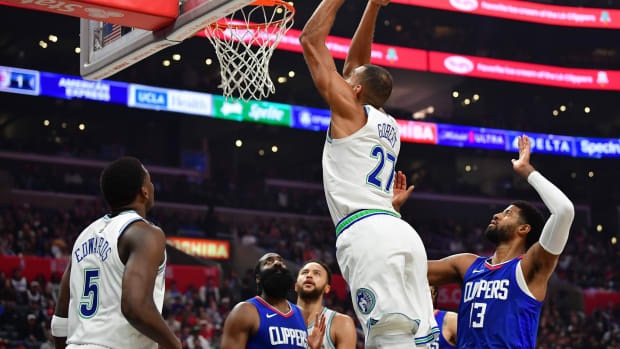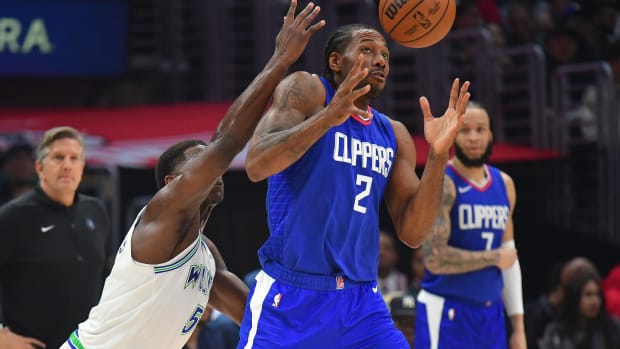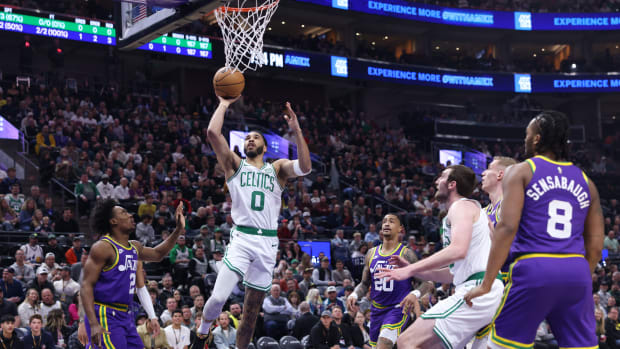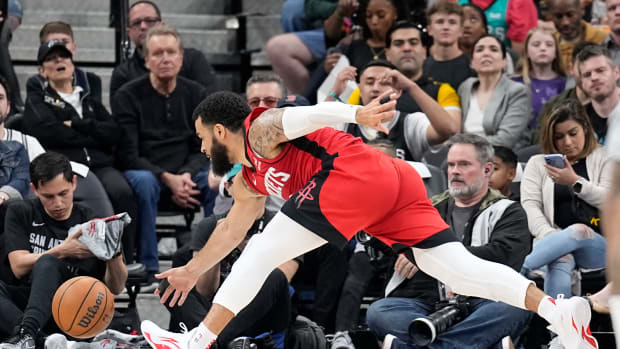
Why the Red-Hot Hawks Are an Intriguing Team to Watch at the Trade Deadline
For many NBA teams this season there have been extended stretches when a glance at the standings felt like a useless way to tell whether they were good or bad. December and January hardly represented NBA basketball, thanks to hundreds of stars, role players, head coaches, trainers and other team employees entering the league’s health and safety protocols, which prevented any collective routine from developing.
Entering February, with the trade deadline just one week away, teams are now left to ponder roster issues that may or may not exist. How much of what’s already happened matters? What flaws are substantive and what strengths are artificial?
The Hawks are as symptomatic of this phenomenon as any other team. At 24–26, and only one game out of 12th place, they’re a massive disappointment seemingly in desperate need of a shake up beyond the mid-January move that sent Cam Reddish to the Knicks for a protected first-round pick and Kevin Knox.
Frustrations that include having the fourth-worst defense in the NBA are why they’re perceived as a logical suitor for Ben Simmons, and why John Collins—who recently confirmed his desire for more touches—is rumored to be on the move even though he just signed a five-year, $125 million contract and is their second-most consistent player.
(Several weeks ago on this very site I proposed a blockbuster trade that would’ve altered Atlanta’s trajectory: a deal founded on Atlanta’s need for a second star while consolidating the soon-to-be-expensive-and-increasingly-impatient young talent they have.)
In early January, Hawks GM Travis Schlenk went on the radio and gave a blistering assessment of his roster, saying, among other things, “Maybe I should lower my expectations for this team.”
But on the same day Schlenk gave that interview, ESPN’s Kevin Pelton revealed the Hawks were one of four teams that had lost at least 1,000 minutes to health and safety protocols this season. Compounded by several lengthy injuries to key contributors, the Hawks were anything but easy to evaluate. Here are a few names that have started for them this season: Chaundee Brown Jr., Skylar Mays, Wes Iwundu and Timothé Luwawu-Cabarrot. De’Andre Hunter has missed more than half the season. Bogdan Bogdanović has missed 18 games. Clint Capela has missed eight. Onyeka Okongwu—who’s shooting 72.9% and is a brick wall on defense—has appeared in only 18.
Over the past couple of weeks, they showed what they can be when healthy. After losing six of seven, the Hawks reeled off seven straight wins, a streak that ended sans Trae Young on Monday night against the Raptors.
The stretch came against some pretty good teams—though it included some injury luck against a Heat team that didn’t have Kyle Lowry or Tyler Herro and a LeBron-less Lakers—and had the Hawks looking like the group many thought they’d be before this season began: a well-balanced, deep, high-octane monster that has enough juice for a playoff run.
How the Hawks have improved
There are several reasons to believe this current stretch is more indicative of who they are going forward than the perilous weeks that preceded it, be it Young’s evolving offensive brilliance (after a slow start he’s living at the free throw line again), Hunter’s incremental journey toward two-way stardom or the way dealing Reddish has clarified Atlanta’s rotation.
The Hawks were always going to have to sacrifice if they wanted to be successful. It took nearly 45 games, but Nate McMillan has seemingly settled into a starting five that, for the most part, satisfies everyone’s individual needs. There is a small-sample-sized caveat in play, but Atlanta’s new starting five of Young, Kevin Huerter, Hunter, Collins and Capela has been amazing in front of an experienced, savvy, explosive all-bench unit that features Bogdan Bogdanović, Danilo Gallinari, Delon Wright, Lou Williams and Okongwu. (They’re +27.3 per 100 possessions in 43 minutes.)
McMillan has done a good job blending those two groups together. The Hawks have started taking (and making) more threes, playing better defense and riding myriad lineup combinations, as was evident when Okongwu closed over Capela in their last two games. And at the heart of all bullishness is Young, a masterly pick-and-roll tactician with limitless range, flair, confidence and vision who doesn’t wreck defenses so much as turn his own team’s pick-and-roll attack into a melodious thrum. Most opposing schemes are useless when he’s surrounded by a lob threat, three-point snipers and a couple of other ballhandlers who broaden what the opposition needs to prepare for. He ranks first in at-rim assists and second in corner-three assists.
Drop, and fall victim to a floater or alley-oop. Blitz, and Young will either scamper around two bodies and score on his own or get off it and let a teammate go 4-on-3. A well-connected switch-everything game plan tends to short-circuit the Hawks from time to time, but it doesn’t take long for Young to solve any puzzle, either by having his big slip the screen (and even diving into the paint without actually setting one), finding the right mismatch or hunting a more vulnerable defender on his own.
Huerter, meanwhile, is better as a starter than a reserve. His shooting splits go from 40.5/23.6/64.3 off the bench to 49.3/42.2/90.5, credibly spacing the floor, driving closeouts, stretching defenses as a real threat on the second side. He’s a cleaner fit in that role than Bogdanović, who’s a natural going unconscious as the second unit’s first option.
Huerter is also long and peppery on defense, built to match up against starters. He moves his feet laterally, is stronger than he looks and makes consistent plays on the ball.
Much like Collins, Okongwu, Capela, Hunter and several other plus defenders on Atlanta’s roster, Huerter is also aware of his responsibilities when it comes time to cover for Young.
Young’s defense will never be ideal, but the Hawks are doing as good a job as they can living with it, especially when teams go out of their way to prey on him with a ball screen, where stress is very real; dealing with it requires focus, prerotations, double teams, quick thinking, a whole lot of length and Young making an effort to either show and recover or battle on a switch. Here’s the best-case scenario.
And here’s what happens when everyone isn’t locked in. If the offense is spaced out and the Hawks refuse to switch, offenses usually carve up their two defenders.
These examples don’t even include the wide pindowns Young has to defend when hiding off the ball, or what happens when he decides to take a play off and watch his man back cut along the baseline for an easy layup. Stops are exhausting. For the season, the Hawks allow a whopping 9.3 fewer points per 100 possessions with Young on the bench, far and away the team’s worst margin. But over the last eight games Young’s defensive rating is 108.8, which is almost a top-10 effort. As last year showed, the Hawks have the personnel to live with Young’s shortcomings on one end and enjoy the fruits of his labor on the other.
But, this recent surge aside, they’re far from perfect and shouldn’t close the door on more moves, or even close off the thought of tinkering with what they already have.
Should the Hawks make a move?
Before they look outside Georgia for help, the Hawks should consider expanding duties held by Okongwu and Hunter, two integral cornerstones who are simultaneously perfect fits in their respective roles and in need of more things to do.
Hunter logs pretty much all of his minutes with Young for defensive purposes, but McMillan may want to find a way to stagger them some, if for no better reason than to give Hunter a chance to spread his wings with the ball. There are flashes of a confident in-between game, supplemented by solid handle, a pretty jump shot that’s unbothered by a contesting hand and a body type that was born to create and then take advantage of a mismatch. The Hawks are a different team if he can maintain all that while making plays for others with Young on the bench. (These changes would disrupt a workable rotation, but may be worth exploring sometime after the All-Star break.)
Okongwu would start for most teams and it’ll be fascinating to see how McMillan handles the more delicate balance between his minutes with Capela, who’s valuable in his own right as a persistent lob threat and one of the league’s best defenders. (Capela also can’t be traded until the offseason.) It wouldn’t be a complete shock to see him come off the bench before the playoffs begin. Changings of the guard happen quickly in the NBA, especially when there’s pressure to win.
Okongwu’s need for more minutes also affects Collins, who enjoys a higher usage at the five beside Gallinari than he does in the starting lineup next to Capela. Scrapping those minutes would be good for the Hawks, but not so great for Collins’s individual production, exacerbating the source of his alleged unhappiness. That’s a shame. Collins is awesome in his role, rebounding, stretching the floor, hitting the occasional face-up jumper and unleashing his athleticism in moments that cry for it.
Assuming Collins wants a larger role, there may not even be one out there. He speaks of wanting to make All-Star teams, cracking the Hall of Fame and being placed in situations where he can process the floor like Nikola Jokić. But where are his strengths better leveraged than Atlanta, next to a generational playmaker who does all the heavy lifting? Collins with a much higher usage might not be the most attractive commodity, but his ambition makes hypothetical trades feel more realistic than they should be—even if the Venn diagram of teams eager to find out how good Collins can be away from Young while also having the pieces to make a deal worth Atlanta’s while isn’t very spacious. (There aren’t a lot of forwards who can space the floor vertically and behind the three-point line.)
The most fascinating exchange would be something like Simmons and Danny Green for Collins and Bogdanović. Simmons is a fantastic fit beside Young, even if adding him would probably require some more redecorating, including another move to ship Capela out of town during the offseason. Simmons and Capela aren’t a wretched fit—especially when Simmons has the ball in his hands—and they can be staggered enough to make it work in the short term. Starting Simmons at the four and then playing half his minutes as a backup point guard/center would improve the Hawks’ defense and give them the clear second star they don’t currently have. (A transaction like this requires a decent amount of faith in Okongwu developing a reliable jump shot, which isn’t far-fetched.)
If Simmons isn’t in the pipeline, the Wizards could offer Spencer Dinwiddie, Rui Hachimura and a first-round pick for Collins. The Spurs can offer Derrick White, Zach Collins and a first-round pick. Collins for the Pistons' Jerami Grant is in the rumor mill, but Atlanta would be better off asking for a package that includes Saddiq Bey and Kelly Olynyk. (It’s unlikely Detroit would be willing to engage with that asking price.)
Watch NBA games online all season long with fuboTV: Start with a 7-day free trial!
But after Simmons, none of these deals are terrific for the Hawks, and they shouldn’t make them unless they feel like moving on from Collins absolutely needs to happen. And if not, then they should chill out, keep Collins (who complements Trae and is—once again—a very talented and valuable player!) and roll down the stretch with a roster that, when healthy, can go toe-to-toe with pretty much any team in basketball.
The Hawks should feel optimistic about where they are and what they can still accomplish in a playoff setting. That doesn’t mean they’re flawless (upgrading at backup point guard would be nice), but several key ingredients that complement one another so well are starting to do just that. There’s good reason to believe they can turn their season around. Just like they did one year ago.
More NBA Coverage:
• The Defense Strikes Back
• NBA Trade Deadline: Five Trades Worth Discussing
• NBA All-Stars: Predicting the Eastern Conference Roster
• NBA All-Stars: Predicting the Western Conference Roster
Sports Illustrated may receive compensation for some links to products and services on this website.
































